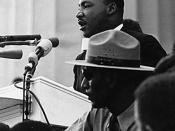Since Herodotus' first annotations of history simply for the purpose of ensuring that "the great deeds of man may not be forgotten", there have been many developments in the reasons behind historical enquiry. As John Tosh outlined in "The Pursuit of History", humanity has changed its theories regarding the purpose of history from seeking understanding of our fate as determined by God, to the belief that we determined our own fate and later that history was of no consequence in determining the future. Thus it is evident that the work of historians has evolved and changed to display their own attitudes towards the uses of history and that these are central to our understanding and interpretation of their works.
Firstly, stemming from the prevalence of religion in the social structures of later historians, the expectation that the will of God would be revealed held a societal relevance that was not widely discredited until the 18th century.
This expectation from history demands to be in the form of a metahistory so that a concise and clear meaning can be derived from the past. When this ideology was initially conceived, around the Medieval age, the pace of life and historical, industrial and social change was far slower than it is in the modern era, making it a more suitable environment for the widespread acceptance that history could relate the majority of knowledge needed in the future. Today, with the constant retraining and mobility of the workforce, the knowledge needed today in many jobs did not even exist ten years ago, for example various expertise required for computer programming, engineering or graphics design. However, it can also be argued that there is still belief in the ultimate fate of the world, which the course of history is inescapably drawing us closer to with...


